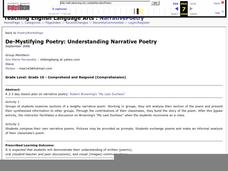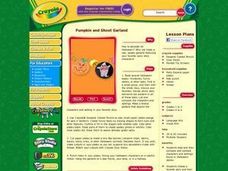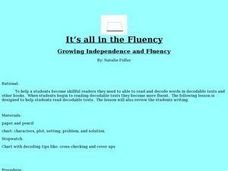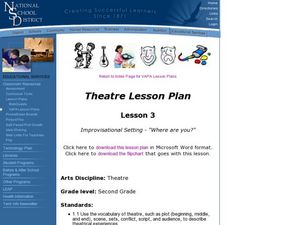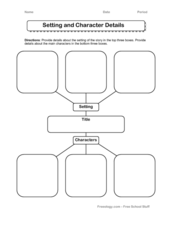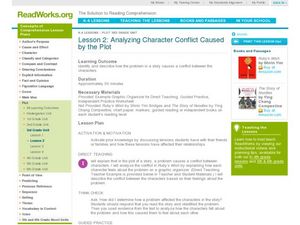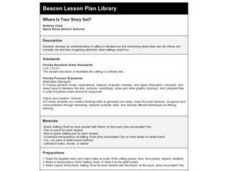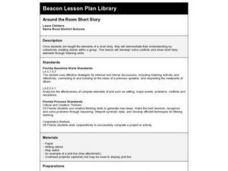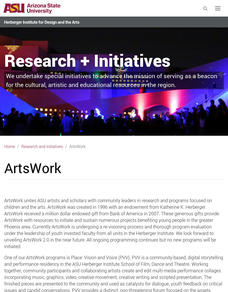Curated OER
De-Mystifying Poetry: Understanding Narrative Poetry
Tenth graders explore narrative poetry. They analyze sections of a poem and present to groups. They compose their own narrative poems using pictures as prompts. They exchange their poems and analyze their classmate's poem.
Curated OER
Pumpkin and Ghost Garland
Reading scary stories on Halloween is frightfully good fun! As elementary learners read several stories for the holiday, they choose a favorite and create a decorative garland representing the characters and setting elements found in the...
Curated OER
The Crucible by Arthur Miller
Begin reading The Crucible and form a foundation for your study with this presentation. Arthur Miller and the historical background of McCarthyism are covered at the beginning, followed by short descriptions of all the characters in the...
Curated OER
It's in the Elements - Lesson Four
Young scholars compare and contrast story elements in two versions of Cinderella. In this literature elements instructional activity, students are read two different versions of Cinderella, they identify the characters, plot, and...
Curated OER
Story vs. Plot
Students, after reading and discussing the two texts by Flannery O'Connor, "Good Country People" and "Greenleaf," analyze the plot, tone, characters, themes and setting in each story. They write their own short stories dealing with a...
Curated OER
It's All in the Fluency
Take a trip to the library! Elementary schoolers visit the library and choose books to read independently. They use the cover-up method of deciphering unknown words and use timed-readings to increase fluency. They discuss characters,...
Curated OER
Improvisational Setting - "Where are You?"
Second graders explore setting through improvisations. In this theatre lesson, 2nd graders perform a variety of improvisations in different settings and chart how they established the setting in the different environments.
Curated OER
Setting and Character Details
In this setting and character worksheet, students provide details about the setting and character in this graphic organizer. Students provide 3 details for each.
Curated OER
Analyzing Character Conflict Caused by the Plot
How do we know how a character was affected by the conflicts they encounter in a story? We use evidence from the text to make assertions about the characters we read about. Third graders practice finding and using evidence in a short...
Curated OER
Narrative Nuts and Bolts
After viewing slides and reading about child labor, young authors compose an original narrative story. They practice note-taking skills and work to effectively engage a reader by incorporating plot, logical order, complex characters,...
Curated OER
Puss in Boots/Jamil and the Clever Cat
Second graders read the story PUSS IN BOOTS identifying main characters, setting, and significant events. They then read the story JAMIL AND THE CLEVER CAT and compare it with the story PUSS IN BOOTS compiling a list of characters,...
Curated OER
Chain Together A Book Report
Individuals examine a book's components, including key events, characters, and vocabulary and develop "chain book reports" with their peers. Strips of paper containing the book's important events are staples together and hung.
Curated OER
Identifying Story Elements
Help your class identify story elements. They will discuss character, setting, problem, and solution after reading a story. A graphic organizer will help them to identify various elements with guided practice and independent practice...
Reed Novel Studies
Three Times Lucky: Novel Study
A car crash, a murder, a hurricane. With such a plot, why is the title of Sheila Turnage's novel Three Times Lucky? After making a prediction about the plot, scholars use the novel study to research and record facts about the United...
Curated OER
Comparing Themes and Plots: "Young Goodman Brown" and "The Minister's Black Veil"
Students read two stories by Nathaniel Hawthorne and write an essay comparing plots and themes. In this Nathaniel Hawthorne short stories instructional activity, students read "Young Goodman Brown" and "The Minister's Black Veil." After...
Curated OER
Comparing Characters Across Two Short Stories
Ninth graders listen to a read aloud of two short stories focusing on literary devices. The write about the settings and realism of the stories, and decide each main character handles the conflict he faces with nature.
Curated OER
Character's Qualities
Sixth graders analyze the a character's qualities and the effects of these qualities on the plot and the resolution of the conflict in the story "The Pigman and Me." They develop a list of the qualities, discuss if these qualities were...
Curated OER
Character and Plot Development Through Comics
Third graders are introduced to character, plot development, point of view, and tone through the use of comic strips. They, in pairs, identify these four attributes in the comic strip and present their findings to the class.
Curated OER
Where Is Your Story Set?
Students explore the concept of setting in literature by identifying their own current setting, and imagining what their ideal setting would be. They read a piece of literature, identify the setting and record the information on a chart.
Curated OER
Story Elements/ Setting
Students practice the story element of setting. In this setting lesson plan, students listen to the story Tulip Sees America by Cynthia Rylant. They discuss and describe the places that Tulip saw in the story.
Curated OER
Story Elements
Middle schoolers in particular will benefit from this simple presentation. Forty slides cover story elements like the protagonist, antagonist, and setting, and literary devices are also included. Some examples are given, but for the most...
Curated OER
Lesson Plan 7: The Elements of Story
Budding novelists work on character development by relating to the characters in their stories. They imagine their own hopes and dreams and recall those of characters from books they've read. Learners also consider struggles the...
Curated OER
Around the Room Short Story
Collective story writing is a great way to reinforce the concept of story elements and collaborative learning. Young writers discuss story elements such as, setting, character, action, climax, conclusion, foreshadowing, dialogue, and...
Curated OER
Creating Plays from Children's Stories
Students explain how individual elements (e.g., plot, theme, character, conflict, etc.) comprise the structure of a play. They write an original one-act play with developed characters, specific setting, conflict, and resolution.
Other popular searches
- Setting Plot Main Characters
- Plot, Characters and Setting
- Plot Characters and Setting
- Setting Plot Characters


